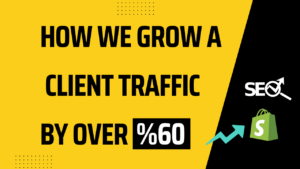
The domain name, which could be described as the virtual address of your website on the web, plays a crucial role in its visibility and proper search engine optimization (SEO). In terms of SEO, it represents both the first impression your visitors will have of your site (and consequently your brand) and provides essential information to search engines like Google. Understanding what an “SEO-friendly domain name” is and how to choose it is therefore vital—follow the guide.
Domain Name: A Definition
A domain name is an alphanumeric string used to identify a resource on the internet. It consists of a subdomain (“www”), a second-level domain (the one you’re prompted to choose), and an extension (the famous “.com” or “.fr”). Put simply, just as we use a postal address to locate a house or apartment in a city, we use a domain name to find a website on the internet. In this sense, the domain name plays a significant role in the natural referencing (SEO) of a website.
The Importance of a Domain Name for a Website
Additionally, the domain name provides valuable indications to users and search engines regarding the nature of your site. Indeed, the domain name is more than just a URL entered by the user in the address bar; it’s an element that reinforces your brand identity and impacts your natural referencing with search engines. A well-chosen domain name allows you to develop these points:
- Recognition: A well-chosen domain name strengthens your brand image.
- Trust: A relevant and professional domain name instills trust in internet users.
- SEO: By applying some SEO recommendations, the domain name can positively influence how search engines perceive and rank your site in search results.
How to Choose Your Domain Name Based on SEO Criteria?
- Choice of Extension (.fr, .com, etc.)
- The length of the domain name
- The presence of hyphens or not
- The language used
- The keywords used
1. The choice of the extension (.fr, .com, etc.)
The extension (or TLD for Top-Level Domain) is the last part of your domain name (e.g., .com, .fr, .org). It’s often associated with your activity’s location or site nature or your organization’s purpose. For local activities, consider a geolocated extension (.fr for France, .ca for Canada). For an international audience, .com remains the most universal and recognized TLD. Additionally, .org is generally linked to NGOs, foundations, and non-commercial organizations.
2. Length of the Domain Name
Be concise! Short domain names are not only easier for users to remember but also reduce the risk of typing errors. Ideally, try to stay under 15 characters. A short and relevant domain name can enhance your brand or business credibility online, while longer domain names that string together keywords are often associated with amateurism among internet users.
From a technical standpoint, domain names can have a minimum length of 1 character and a maximum length of 63 characters for the label (your brand name or keywords before the extension). Remember, a concise domain name is always easier to remember for your target audience!
3. Presence of Hyphens
Is the domain name “easy-gardening.fr” more SEO and user-friendly than “easygardening.fr”? It’s not straightforward to decide, although the general opinion tends to outright reject using hyphens in the domain name. Hyphen usage is generally disfavored. Therefore, “easygardening.fr” would be preferable for a gardening-related site, among other reasons, due to being easier to communicate, especially verbally.
4. Language Used
The domain name’s language often provides an initial indication of the target audience for a website. By using terms intelligible to the target audience, it helps them form an initial idea about the site’s content. For example, a domain with clearly German terms will instantly be identified as intended or at least relevant for a German-speaking audience.
Moreover, the language used in a domain name may have SEO implications. Search engines, aiming to provide the most relevant results, consider the language to determine a site’s quality for a given query.
5. Keywords Used
Once you’ve defined your target audience and chosen the most suitable language for your domain name, be strategic in selecting the words used. It’s no secret that a good SEO strategy relies heavily on relevant and well-thought-out keywords, and this holds true for choosing a domain name.
If your company lacks significant notoriety (i.e., its name isn’t widely recognized like brands such as Prada, Carrefour, or Leroy Merlin), including keywords in the domain name can be beneficial. For instance, if your company sells gardening items, then “easygardening.fr” is suitable.
By using relevant keywords in your domain name, you may gain some SEO advantages:
- Instant recognition: Relevant keywords in a domain name immediately indicate the site’s theme or offer to users. For example, “bakerynantes.fr” clearly indicates a bakery located in Nantes.
- Minor SEO boost: In the early days of search engines, Exact Match Domains (EMDs) received better SEO almost automatically. For instance, a domain name like “Bank.fr” would have been highly ranked for the query “bank in France.” Today, algorithms have evolved, but choosing a domain name containing relevant keywords still offers a slight advantage in SEO.
- Higher click-through rates: Domain names with keywords can increase click-through rates from search engine results pages by highlighting the site’s relevance to the user’s query.
However, your domain name shouldn’t turn into a string of keywords aimed solely at gaining SEO points. Search engines tend to discredit domain names that incorporate too many keywords. Moreover, sites accumulating keywords in their domain names might be labeled as “spam” and lose credibility—and consequently, their chance of ranking well.
Purchasing an Old or New Domain: What’s the Difference for SEO?
The purchase of a domain name, whether it’s old (also referred to as “expired” or “pre-owned”) or new, can have various implications for SEO. These implications largely stem from the domain’s history, reputation, and technical characteristics.
- Advantages of Choosing an Old Domain
- Risks of Choosing an Old Domain
- Advantages of Choosing a New Domain
- Risks of Choosing a New Domain
1. Advantages of Choosing an Old Domain
- Presence of backlinks. If numerous external sites link back to your site’s URL, you could benefit from these backlinks. Outbound links to your site are considered by search engines and contribute positively to SEO.
- SEO ranking advantage due to age. Most experts believe that a well-established domain is often associated with greater reliability for both users and search engines.
- Historical traffic. If your old domain previously directed traffic to a site with substantial traffic, acquiring this domain could inherit some of that traffic. However, over time, this effect might diminish, especially if your site’s content differs significantly from the previous one.
2. Risks of Choosing an Old Domain
- Poor reputation. If the domain was penalized in the past for SEO malpractices, it could adversely affect your SEO.
- Toxic backlinks. Similarly, if numerous incoming links from poor-quality sites point to the domain, you might need to clean up your site using tools like the “disavow” button in Google Search Console.
3. Advantages of Choosing a New Domain
- Starting from scratch. Opting for a new domain that has never been used online allows you to start from a clean slate in terms of SEO and ranking. You won’t face surprises concerning the domain’s history and have full control over your SEO strategy.
- Customized branding. By selecting a “new” domain name, you can pick the most relevant keywords or brand name for your site. Thus, you can incorporate your company’s website domain into a broader brand strategy.
4. Risks of Choosing a New Domain
- Lack of SEO authority. Without any history, your domain won’t inherit past backlinks. You’ll have to build its reputation and authority from scratch on search engines.
Related article : Conquer the Web: Mastering Offsite SEO Strategies for 2024





